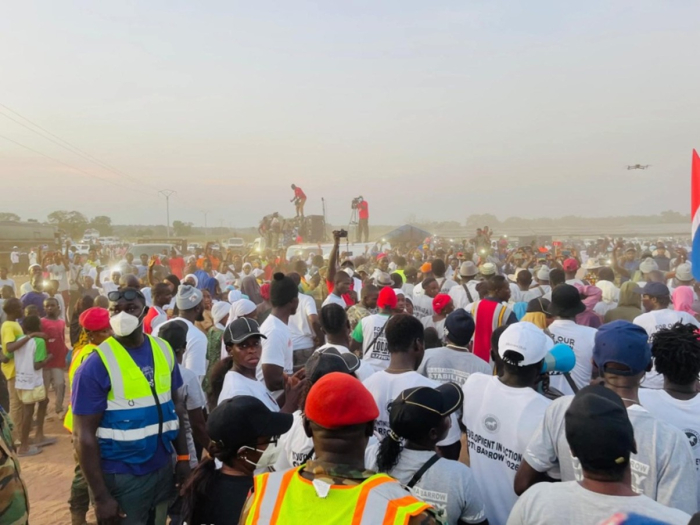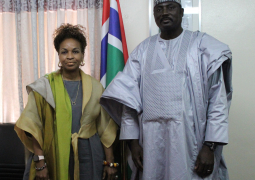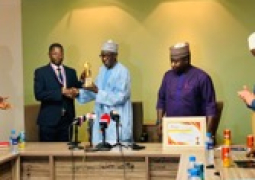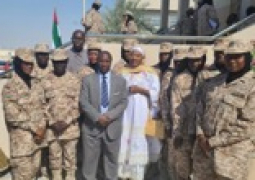
Given its strategic location, residents argued that a well-resourced Kudang Hospital could handle most medical cases locally, reducing the need for referrals to Bansang Hospital. They stressed that healthcare improvements would significantly ease the burden on families and improve access to essential services.
Infrastructure was another pressing issue raised. Like many other communities visited during the tour, Niamina residents highlighted the poor state of interior roads linking villages. They emphasised that reliable road networks are vital for trade, mobility and access to services.
Farmers in Niamina Dankunku also appealed for cattle drinking points, noting that the growing livestock population has intensified competition for water, particularly during the dry season. They warned that without proper facilities, conflicts between farmers and herders could escalate.
Beyond these demands, residents called for a reliable ferry service to connect the Central River Region to the northern bank of the country. They argued that improved river crossings would boost trade, ease travel and strengthen ties between communities.
The appeals reflect the broader concerns of rural Gambians, who continue to press for infrastructure, healthcare and agricultural support as President Barrow’s tour progresses across the country.
In a well attended meeting at Mamud Fana, in CRR South, Mam Mbaye, on behalf of the village alkalo, underscored the dire state of healthcare in the three districts. He noted that only two hospitals serve the area, both of which fall short of standards. He appealed for a modern, well-equipped hospital that could serve the entire region. Mbaye also urged the government to provide a borehole, upgrade local schools to Grade 12, and construct teachers’ quarters.
Mamud Ceesay, representing the youth, echoed these concerns, stressing that “before politics, one must be healthy.” He called for more nurses, particularly women, and reiterated the need for a fully equipped hospital in Mamud Fana.
Roads, Electricity and Agriculture
Infrastructure was a recurring theme throughout the meeting.
Alhagie Samba Mbaye of Mamud Fana thanked President Barrow for ongoing road developments nationwide but highlighted the poor condition of roads linking Dalaba to interior villages. He appealed for electricity expansion, noting that many communities remain in darkness.
Ganyaido Jallow urged the President to prioritise road construction in Dalaba, Choya and other villages, while also calling for community gardens, tractors, and timely fertiliser distribution.
Oumie Ceesay, the Lady Councillor, pressed for electrification of all villages in the three districts by 2026 and emphasised the empowerment of women’s groups through large community gardens that could sustain farming in both rainy and dry seasons.
Women’s Empowerment
In a significant gesture, a cheque for over two million dalasis was presented to women’s groups in the Central River Region. More than 20 groups, representing over 1,000 women, benefitted from the support, underscoring the government’s commitment to female empowerment.
Agriculture Minister Demba Sabally assured farmers that mobile money services would be widely available this season, preventing middlemen from exploiting them. He confirmed that all seccos across the country would operate, ensuring fair trade.
Sabally also highlighted ongoing agricultural projects, including upgraded community gardens and small ruminant initiatives that will establish cattle drinking points nationwide, with one planned for Niamina Dankunku. He urged elders to resolve lingering land disputes that have hindered development projects.
President Barrow reminded the gathering that under previous governments, no village in Niamina Dankunku had electricity – a situation he said his administration has changed. He assured residents that electrification would extend to the remaining villages, including those in Niamina West.
On healthcare, Barrow pointed to his initiative of community ambulances aimed at improving maternal and emergency care. He reaffirmed his government’s commitment to constructing major roads and dismissed claims of fertiliser shortages, insisting that supplies remain available.
Barrow concluded by stressing that his sole focus is on uplifting the living conditions of Gambians, declaring that the peace and development achieved under his leadership is unprecedented in the country’s history.





